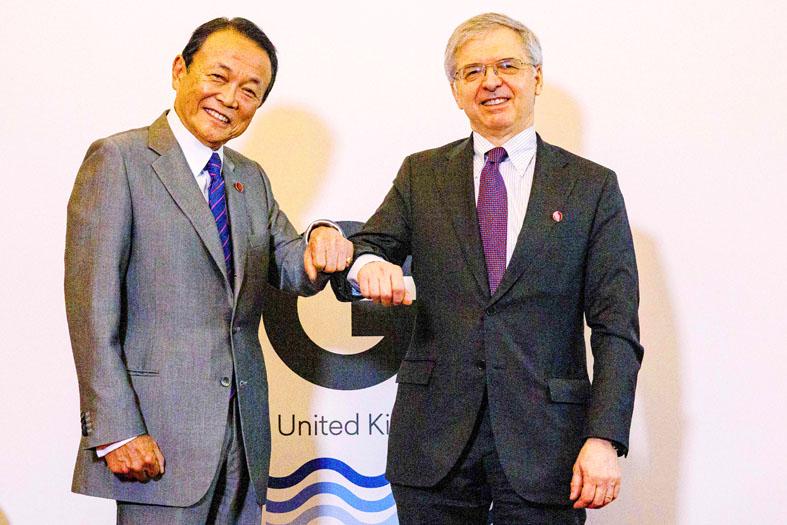Japan and the US would have to defend Taiwan together in the event of a major problem, Kyodo News reported Japanese Deputy Prime Minister Taro Aso as saying, marking some of the highest-level remarks from Tokyo on the sensitive subject.
In comments at a political fundraising party in Tokyo on Monday, Aso said an invasion of Taiwan by China could be seen as an existential threat, allowing Japan to exercise the right to collective self-defense, Kyodo reported.
Japan has sought to avoid alienating China, its biggest trading partner, while maintaining its alliance with the US amid tensions between the world’s two largest economies over topics ranging from the origins of COVID-19 to human rights.

Photo: AFP
Aso told reporters yesterday that the most desirable outcome was for the parties involved to reach a peaceful solution through direct talks.
“We have to think about various situations, such as not being able to pass through the Taiwan Strait,” Aso said. “It’s difficult to say overall which would be an existential threat.”
Japanese Chief Cabinet Secretary Katsunobu Kato told a news conference that he did not know the details of Aso’s comments on defending Taiwan and declined to comment on them.
The Ministry of Foreign Affairs yesterday said it is glad that the international community is concerned with stability in the Taiwan Strait, adding that Taiwan would continue to work with like-minded nations to maintain peace across the Taiwan Strait.
China, on the other hand, said Aso’s comments were “extremely wrong and dangerous.”
Chinese Ministry of Foreign Affairs spokesman Zhao Lijian (趙立堅) told a regular news conference in Beijing that “we will never allow any country in any way to interfere in the Taiwan question, and nobody should underestimate the Chinese people’s strong determination, will and ability to safeguard national sovereignty.”
Tensions have grown around Taiwan in the past few months, with China sending 28 military planes close to the nation last month, the largest exercise this year.
Japanese Minister of Defense Yasuhide Nakayama said in a presentation to a Washington think tank last month that China presented a growing threat and it was necessary to protect Taiwan as a “democratic country.”
Chinese officials urged Japan to disavow Nakayama’s remarks, which they described as sinister, irresponsible and dangerous.
Kato said the comments represented a personal view.
While Japan’s pacifist constitution limits the scope of its armed forces, a 2015 reinterpretation of the document allows it to send troops to overseas conflicts in some circumstances.
Additional reporting by CNA

Nvidia Corp yesterday unveiled its new high-speed interconnect technology, NVLink Fusion, with Taiwanese application-specific IC (ASIC) designers Alchip Technologies Ltd (世芯) and MediaTek Inc (聯發科) among the first to adopt the technology to help build semi-custom artificial intelligence (AI) infrastructure for hyperscalers. Nvidia has opened its technology to outside users, as hyperscalers and cloud service providers are building their own cost-effective AI chips, or accelerators, used in AI servers by leveraging ASIC firms’ designing capabilities to reduce their dependence on Nvidia. Previously, NVLink technology was only available for Nvidia’s own AI platform. “NVLink Fusion opens Nvidia’s AI platform and rich ecosystem for

‘WORLD’S LOSS’: Taiwan’s exclusion robs the world of the benefits it could get from one of the foremost practitioners of disease prevention and public health, Minister Chiu said Taiwan should be allowed to join the World Health Assembly (WHA) as an irreplaceable contributor to global health and disease prevention efforts, Minister of Foreign Affairs Lin Chia-lung (林佳龍) said yesterday. He made the comment at a news conference in Taipei, hours before a Taiwanese delegation was to depart for Geneva, Switzerland, seeking to meet with foreign representatives for a bilateral meeting on the sidelines of the WHA, the WHO’s annual decisionmaking meeting, which would be held from Monday next week to May 27. As of yesterday, Taiwan had yet to receive an invitation. Taiwan has much to offer to the international community’s

CAUSE AND EFFECT: China’s policies prompted the US to increase its presence in the Indo-Pacific, and Beijing should consider if this outcome is in its best interests, Lai said China has been escalating its military and political pressure on Taiwan for many years, but should reflect on this strategy and think about what is really in its best interest, President William Lai (賴清德) said. Lai made the remark in a YouTube interview with Mindi World News that was broadcast on Saturday, ahead of the first anniversary of his presidential inauguration tomorrow. The US has clearly stated that China is its biggest challenge and threat, with US President Donald Trump and US Secretary of Defense Pete Hegseth repeatedly saying that the US should increase its forces in the Indo-Pacific region

ALL TOGETHER: Only by including Taiwan can the WHA fully exemplify its commitment to ‘One World for Health,’ the representative offices of eight nations in Taiwan said The representative offices in Taiwan of eight nations yesterday issued a joint statement reiterating their support for Taiwan’s meaningful engagement with the WHO and for Taipei’s participation as an observer at the World Health Assembly (WHA). The joint statement came as Taiwan has not received an invitation to this year’s WHA, which started yesterday and runs until Tuesday next week. This year’s meeting of the decisionmaking body of the WHO in Geneva, Switzerland, would be the ninth consecutive year Taiwan has been excluded. The eight offices, which reaffirmed their support for Taiwan, are the British Office Taipei, the Australian Office Taipei, the